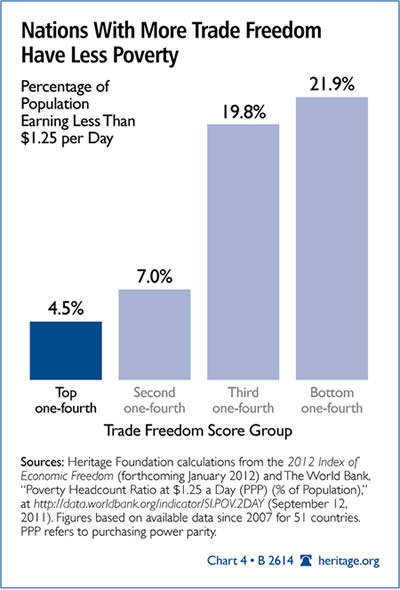Some critics of free trade say that trade agreements just help the “rich” get richer while making the “poor” poorer, but in fact, free trade benefits everyone.
Looking at data from The Heritage Foundation’s 2012 Index of Economic Freedom, Heritage’s Bryan Riley and Ambassador Terry Miller found that the benefits of free trade are far reaching.
Their data demonstrate “a strong correlation between trade freedom and a variety of positive indicators, including economic prosperity, low poverty rates, and clean environments.” The chart below indicates that nations with more trade freedom have less poverty.
Special interest groups lobby for protectionist policies—allegedly to benefit workers—but higher trade barriers actually prevent countries from experiencing greater prosperity. Instead, countries should implement free trade policies to bolster economic growth, create jobs, and reduce poverty. The recently passed free trade agreements with Colombia, Panama, and South Korea will strengthen the American economy and enhance our quality of life.
The United States should continue to look for opportunities to enhance free trade with other countries. The proposed Trans-Pacific Partnership offers another opportunity to expand trade. The biggest gains could come if the current Administration establishes a deadline for successfully concluding the World Trade Organization (WTO) Doha Development Round. These negotiations were initially started to help countries develop through increased trade, but persistent protectionist policies in many countries continue to hamper the benefits of free trade. A positive conclusion to the Doha Round would benefit all WTO members.
For more information on the benefits of free trade, read Global Trade Freedom Needs a Boost at Heritage.org.
Brittany Cobb is a member of the Young Leaders Program at the Heritage Foundation. Click here for more information on interning at Heritage.


























